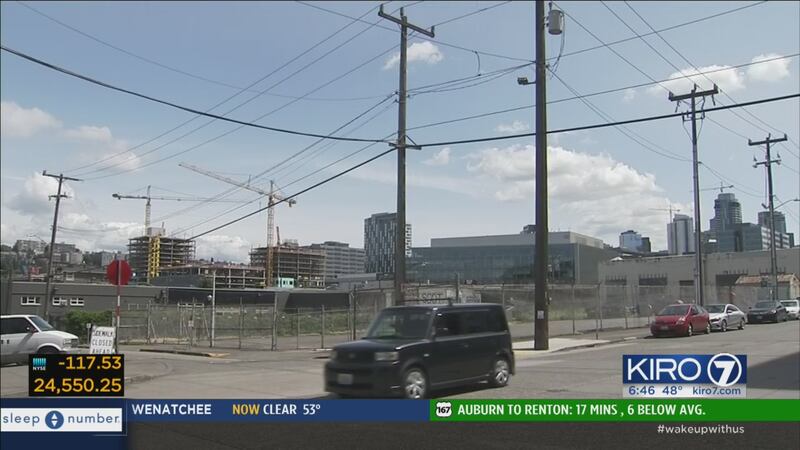SEATTLE — Mayor Jenny Durkan officially confirmed a new homeless encampment in South Lake Union Wednesday as part of her new plan for homelessness and housing, one day before the city will hold a community engagement meeting about the site.
Scroll down to continue reading
More news from KIRO 7
- John Reed found guilty of murdering Oso neighbors
- Fight at Lake Stevens park caught on camera
- King County sheriff's deputy subject of police standoff
- Helping Seattle's homeless: Where things stand
- Massive new cruise ship arrives in Seattle
KIRO 7 has been investigating plans for the new tiny house village at 8th Avenue North and Aloha Street since April 27, on a tip from a community member who was told about plans by the city. The president of the South Lake Union Community Council confirmed on May 11th that he had been briefed on the encampment. KIRO 7 received a flyer advertising the new encampment, and the flyers were distributed throughout the community soon after. The city refused to confirm the plans.
Even as recently as May 16, a spokesperson for the city's Human Services Department, Meg Olberding, told KIRO 7, "There is no definitive plans [sic] until the city has done community outreach, review of the site, and the mayor presents a budget plan to City Council— none of which has happened yet."
"Why has the city been refusing to answer questions about this when you are clearly so proud of it?" KIRO 7 reporter Linzi Sheldon asked Durkan. "And also, why make the announcement before the city has its community engagement meeting tomorrow night?"
"This announcement shares the entire plan not just for 8th and Aloha," Durkan said. "There's been a lot of misunderstanding around this situation and I think how it's been characterized, with due respect, is not really fair. What we're guilty of is people wanted to start talking to the community right away so we can move right away and they did it before we announced the final plan.
"We as a city have to own... that we need to have clear engagement, that people aren't feeling like they're being left out, that we're trying to pull a fast one. I want to be as transparent as possible," she added.
The city has now confirmed it wants to put 54 homes on the site, a city-owned parking lot that KIRO 7 discovered earned the city about $131,000 last year.
"Will drugs or alcohol be allowed on that site?" KIRO 7 asked Sharon Lee, executive director of the organization that will be running the site, LIHI.
"We're still working with the city on that," Lee said, "and so we are looking at a possibility that the rooms will be including people -- everyone -- like people who are clean and sober as well as people who are using."
Drugs will not be allowed at a new tiny house village at 18th Avenue and East Yesler Way.
"It will include a fence," Lee said, "a gatehouse, and staff, full-time staff."
In the mayor's new plan, the Whittier Heights tiny house women's village, the 8th and Aloha site, the tiny house village at 18th and Yesler, a City Hall shelter, and expanding others will together provide 300 new beds. It would cost about $4.2 million.
But some people, like Ballard resident Erika Nagy, are skeptical about the process. She attended the community engagement meeting for an encampment in Licton Springs.
"The conversation has always been after the fact," she said. "The conversation has been 'Hey, we want your feedback, but this decision has already been made.'"
Last week, KIRO 7 obtained data directly from the Seattle Police Department which states that year to year crime in the Licton Springs encampment's block alone increased 103 percent. LIHI said Wednesday it's securing the fence there and adding security cameras.
"I know it's an issue," Durkan said of Licton Springs. "We're not going to pretend it's not an issue but we're also not going to draw a broad brush to say it should tarnish everything."
She said there needs to be more of a conversation about that particular encampment.
"There has been a conflation of a lot of the different data and I have worked very carefully with Carmen Best in our police department to see what more should we be doing about enforcement."
And the city is trying different approaches, like an emphasis zone that stretches from Battery to Pike and from the Seattle waterfront sign near Alaskan Way up to 1st Avenue. In this zone, people can be cited for criminal trespassing if they’re camping. But after answering four questions, the mayor had to leave.
“Mayor Durkan, could you address the emphasis zones downtown? They just popped up,” reporter Linzi Sheldon said.
“I'll get back to you on that,” Durkan said. “Okay. Thanks a lot.”
The mayor’s office pointed out that the creation of the emphasis zones predates Mayor Durkan and that the zones are part of the navigation team’s work.
The city’s navigation team, which is responsible for removing unsanctioned homeless encampments, acknowledged the emphasis zone signs in the area are new and that it can be challenging to monitor those zones to ensure people don't move back in.
Cox Media Group








